
English_books / New Cambridge Advanced
.pdf
Living with a computer
Reading
1Find out from your partners:
•when they use a computer and what for
•how they think a computer can help you, entertain you, confuse you, etc.
•what they enjoy and hate about using a computer
2 Read this article and guess what the missing words are — fill each gap with one word.
Spammed
HE |
FIRST sign |
that something |
|
of these lists can generate 50 messages a |
my |
share |
of |
get-rich-quick |
|
||||||||||||||
|
day. To avoid a |
|
|
|
of junk e- |
pitches and cheesy magazine ads. But I |
|
||||||||||||||||
was |
|
|
|
came Sun- |
|
|
|
|
|||||||||||||||
|
|
|
I |
painstakingly |
|
unsubscribed |
from |
had never experienced anything like this: |
|
||||||||||||||
Tday |
|
|
|
|
|
|
|
|
|||||||||||||||
afternoon, |
when |
I |
logged |
all 106 - even Barry Manilow's - only to |
a parade of mail that just got bigger and |
|
|||||||||||||||||
onto the Internet to |
check my weekend |
log |
|
on |
Monday |
morning |
and |
|
|
|
. . . |
not only was I |
|
||||||||||
|
|
|
|
I'd |
|
been |
subscribed |
getting hundreds of subscription notices, |
|
||||||||||||||
e-mail and |
found |
that someone had |
|
|
|
|
|
|
|||||||||||||||
overnight to 1,700 more. My file of unread |
but I was |
also |
receiving |
copies |
of every |
|
|||||||||||||||||
|
me in a Barry Manilow |
|
|||||||||||||||||||||
|
was |
growing |
by |
the |
piece |
of mail posted |
to |
those |
lists. By |
|
|||||||||||||
fan club, a |
Mercedes |
owners |
discussion |
|
|||||||||||||||||||
|
|
|
|
|
|
|
|
|
Monday the e-mail was |
|
|
|
|||||||||||
|
, |
a |
Fiji |
|
Islands |
|
|
|
|
|
|
|
|
|
|
|
|
||||||
|
|
I'd |
heard |
about |
"spam" |
- Internet |
in at the rate of four a minute, 240 an |
|
|||||||||||||||
appreciation society |
and |
103 |
other |
|
|||||||||||||||||||
Internet mailing lists I'd never heard of. I |
jargon |
for machine-generated junk mail |
hour, 5,760 a day. |
|
|
|
|
||||||||||||||||
knew from |
|
|
|
that any one - and over the years |
|
I'd |
|
|
|
|
|
Philip Elmer-Dewitt |
|
||||||||||
TT 3 Compare your answers.
T" © 1 Where do you think these missing keys go on the English keyboard below:
Where does D go?
D probably goes between
S and F in the third row
2Discuss these questions:
•When you use a keyboard, which letters do you find the hardest to get right?
•Which are -frte- the English words that you mis-type -msot- most often?
•Different countries use different keyboards: how is your national keyboard different from the one above?
•If you're writing the following things do you prefer to use a computer or a pen? Why?
personal letters homework assignments business letters rough drafts notes essays lists

New Cambridge Advanced English
1 Read this advertisement and fill each gap with one word:
Writing unlimited
T h e freedom to write and think is for all of us. Now, there is a new word processor
that's just |
for us, too. It's called MacWrite® II, and it's made by Claris. MacWrite II |
||
makes it possible |
share your ideas and thoughts with other computers and word |
||
processors. You'll be |
to open documents from over 50 word processors, on all kinds |
||
of computers, with all kinds of |
, and work on them without reformatting. |
||
But there's more you can do. (The feature is called XTND.) You can import graph-
ics, not |
|
from Macs, but many computers, guaranteed. And you can scale and |
|||||
crop them, |
and all, in your MacWrite® II document. In short, MacWrite® II with XTND |
||||||
is a powerful word processor that lets you freely exchange text and graphics. You'll |
|||||||
find also that your MacWrite® II |
you change fonts, styles, sizes and colors, as well as |
||||||
text with its |
find/change feature. And |
can |
create custom styles and save them |
||||
as stationery - with all formats preset. You'll |
|
your reports and letters quickly. |
|||||
But |
what |
good is freedom of expression if |
you |
find |
editing to be a hassle? That's |
||
why the |
page layout and editing |
is fully WYSIWYG: |
the |
you see are the |
|||
thoughts you get. This WYSIWYG feature, by the way, is found only with MacWrite® II. It's another way Claris simplifies word processing for you, whether you're 52, 22, or 72.
Called upon daily MacWrite® II smooths your writing assignments and other chores.
There's MacWrite |
II spell checking, for example, and foreign dictionary programs |
|
that are optional, |
a host of other features that come standard. (Like a thesaurus, and |
|
a mail merge feature |
discover saves lots of time.) |
|
What it adds up to, you'll |
is a simple and powerful tool designed for people. All |
|
the people. It is for writers, and |
is for business people. And it is for those of us in |
|
between. The freedom to write is |
. Now technology is, too. |
|
2 Here is a list of the features of the application. Tick the ones that are mentioned.
MacWrite® II |
|
• |
|
1 |
makes it possible to share thoughts with computers |
|
|
2 |
can translate foreign language documents |
|
• |
3 |
allows you to open documents from over 50 word processors |
• |
|
4 |
produces drafts of letters for you |
|
• |
5 |
writes speeches for you |
|
• |
6 |
allows you to import graphics |
|
• |
7 |
allows you to scale and crop graphics |
|
• |
8 |
lets you freely exchange text and graphics |
|
• |
9 |
What is the name of the feature that makes all these things possible? |
||
10 |
WYSIWYG means |
is |
|
T 3 Highlight any useful vocabulary you'd like to remember in the advertisement.
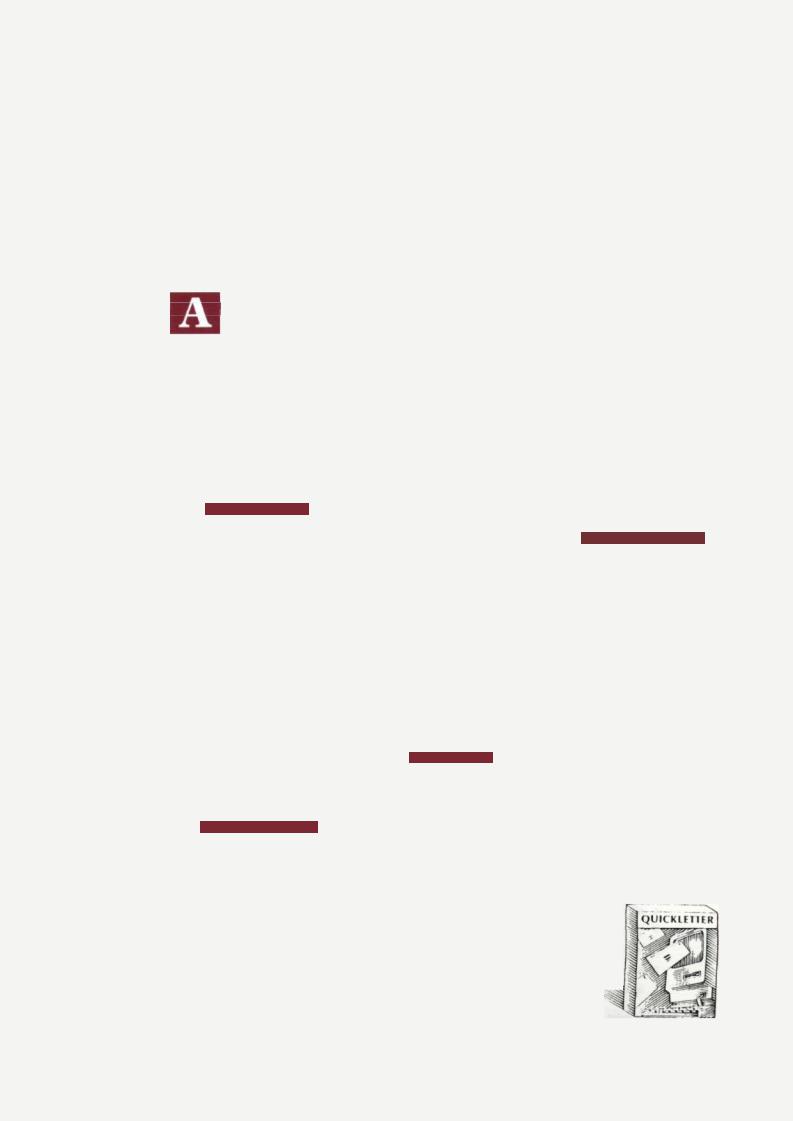
Formal letters and personal letters
Reading and Effective writing
Find out from your partners:
• how they keep in touch with friends or relatives in another country
• why they enjoy/don't enjoy writing personal letters - and business letters
1 Read this advertisement.
THE SECRETS OF WRITING BUSINESS LETTERS
s far back as biblical times businessmen have used powerful communication
to achieve wealth and position. Even today the right message at
the right time can lead to sweet success.
Want money? A promotion? To sell something? Explain something? Then write a good letter.
Letter writing is not a lost art just a forgotten one. The principles still exist. If you try them you'll see improvement in your very next letter.
TO BEGIN WITH
1. Start from the end. Decide what you'd like to happen as the result of your letter.
Make a list of all the things you'd like to say. Look them over. Find any that don't support your main cause, and cross them off without remorse.
Remember, the best letters have a strong sense of purpose.
2. Get to the point early. If your reader wanted a mystery, he'd be reading Raymond Chandler. A letter should tell whodunit in the first paragraph.
3- Put yourself in your reader's place. Think: if the same letter came to you, how would you respond?
Therefore, be friendly. Be nice. And find ways to turn negative statements into positive ones.
NO BUSINESS-ESE
4. Say it plainly. There is no such thing as a "business language". Phrases like "in compliance with your request and enclosed herewith" will only make you seem like a robot. Write the way you talk, naturally.
Keep your sentences short - one idea in each. Any sentence longer than two typed lines is automatically suspect.
5. Clear the deadwood. Chop out words, sentences, and even
whole paragraphs if they don't contribute. Work hard so your reader won't have to.
In particular, cast a questioning eye on adjectives. They can sap the strength from your words, or stretch your credibility. As Voltaire put it, "The adjective is the enemy of the noun."
6. Use active verbs. Face it, the passive voice is wimpy. 'A decision has been reached by the committee" wouldn't last three rounds in the ring with "The committee has reached a decision."
Also, your reader will sniff a coverup if you write: "Your order has been misplaced" instead of "I misplaced your order." Courage!
7. Be human. Your letter should read like a conversation, not a decree. Address your reader by name:
"Dear Ms Hartman." And if you can fit it in naturally use Ms Hartman's name once or twice in the body. You want her to know you wrote the letter just for her.
Whenever you can, use pronouns like /, we and you. Especially you - it's an arrow straight to your reader's heart.
BE POSITIVE
8.Never write in anger. Your anger will evaporate; your letter won't. President Truman often vented his fury in letters. He also had the sense never to send them.
Devise a way to handle the problem in an upbeat manner. Your chances of success will multiply tenfold.
9.End it with an action step. The last sentence of your letter should suggest the reader's next move. Or your own next move.
Resist the hat-in-hand, shuffling type of exit: 'Again, thank you for ..." or "If you have any problems, please don't hesitate to call."
Instead, try closing with a plain and simple "Sincerely", and your signature. It may be the perfect ending.
10.Be professional. The strongest business letter in the world can't survive a bad presentation.
Set up a clean, logical format for your letter. A crowded or overdesigned page will distract from your message.
11.Develop a regimen. The keys to powerful correspondence are 1) writing often, and 2) responding quickly.
If it sounds like work, read on.
WRITE FOR POWER
The easiest way to more powerful correspondence is QuickLetter™ from Working Software.
Unlike heavy-duty word processors, QuickLetter is designed to do one thing and one thing only - write letters fast.
Here's how:
QuickLetter's built-in address book places your reader's name and address into your letter. Automatically.
QuickLetter's page preview displays your letter, vertically centred, in the format you've defined. Automatically.
QuickLetter addresses any size envelope. Automatically.
And the list of features goes on. There you have it. All the secrets of brilliant business correspondence
at your fingertips. Except one. And you can pick that up at your local software store.
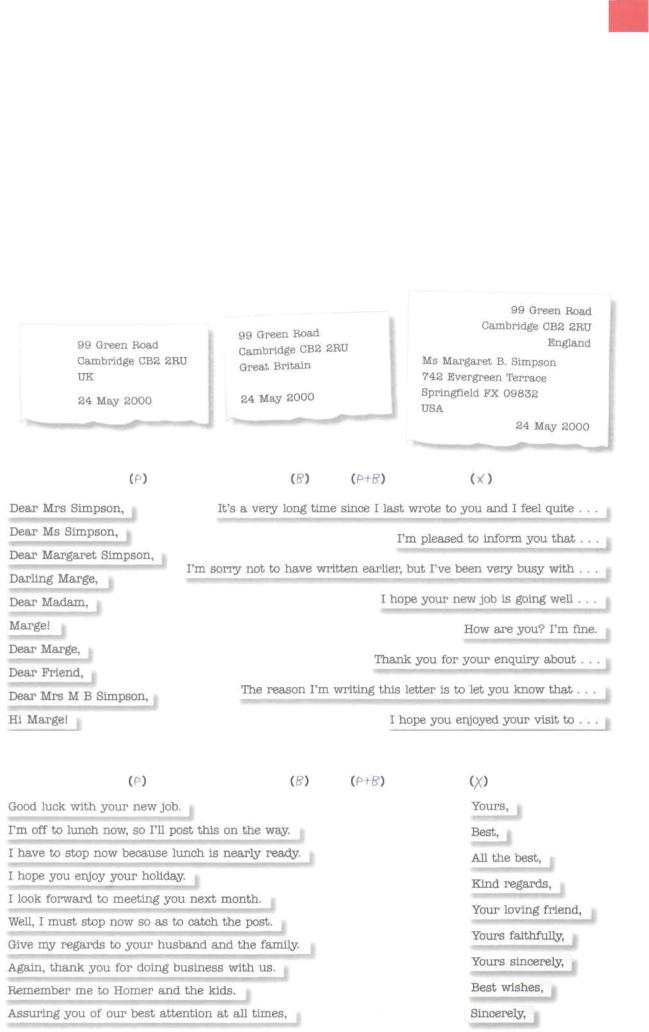
New Cambridge Advanced English
2Highlight the following words and phrases in the advertisement (the number shows which heading to look in). Try to work out their meanings from the context.
remorse , |
whodunit 2 suspect A deadwood 5 sap the strength 5 |
credibility 5 |
wimpy 6 |
cover-up 6 |
vented his fury 8 upbeat 8 tenfold 8 hat-in-hand 9 |
regimen „ |
heavy-duty |
3Discuss these questions:
•Where was the ad originally published and who is it meant to be read by?
•Which of the 11 pieces of advice given do you agree with and which do you disagree with?
•Which of the advice also holds good for each of the following:
personal letters essays reports narratives exam answers
1 Decide which of these letterheads would be suitable for a personal letter, a business letter or neither:
2 Decide which of these opening phrases would be suitable in:
a personal letter |
a formal business letter |
both |
- or in neither |
3 Decide which of these closing phrases would be suitable in:
a personal letter |
a formal business letter |
both |
- or in neither |
4 Add one more opening phrase to C2 and two more closing phrases to C3.

The differences between spoken and written English
Listening
You'll hear the beginning of a lecture on spoken and written English. Read this summary of the lecture and fill the gaps as you listen.
SPEECH: 'rapid conversational English' - happens face to face, it's
WRITING: 'formal written English' |
|
|
||
- happens alone, |
it's |
|
|
|
Main differences between speech and writing: |
|
|
||
1 |
Hesitation |
|
|
|
|
- in speech we hesitate to give us time to think while we're speaking |
|
||
|
- in writing hesitation not apparent because the writer |
- but the |
||
|
|
doesn't notice the pause |
|
|
2 |
Listener contact |
|
|
|
|
- the people in a conversation are always |
|
|
|
|
- question tags (rather like a |
!) |
|
|
|
- |
contact |
|
|
|
- |
at end of lecture |
|
|
3 |
'Silent language' |
|
|
|
|
- body language e.g. |
|
|
|
|
|
|
||
|
- gestures e.g. |
, |
|
|
|
|
|
|
|
|
- invisible in a |
or on the |
|
|
|
|
|
|
|
4 |
Tone of voice |
|
|
|
|
|
|
|
|
1Discuss the lecture - what did you find most interesting (and least interesting) about it?
2One of you should look at Activity 10, the other at 29. You'll each have some more examples of the differences between speech and writing. Use these ideas to continue your discussion.
A tactful letter
Creative writing
Choose ONE of these topics, make notes, and write a suitable letter (about 250 words).
Write a letter to Mr and Mrs Brown, some English friends you stayed with for a few days last summer. You forgot to write them a thank-you letter after your stay. Now you're soon going to England again and you'd like to stay with them again.
OR
Write a letter to your rich Uncle Peter in the USA, asking him to lend you some money for a round-the-world trip. You forgot to write him a thank-you letter when he sent you $50 for your birthday.
1Show your completed letter to a partner. Would he or she let you stay/lend you money after reading the letter?
2Write a postcard in reply to your partner's letter as if you were the Browns or Uncle Peter (about 50 words).
If you don't feel like writing a letter, or don't have the time, why not send a picture postcard? Although people like to receive personal letters, postcards can be more permanent - lots of people keep them and pin them up on their wall.
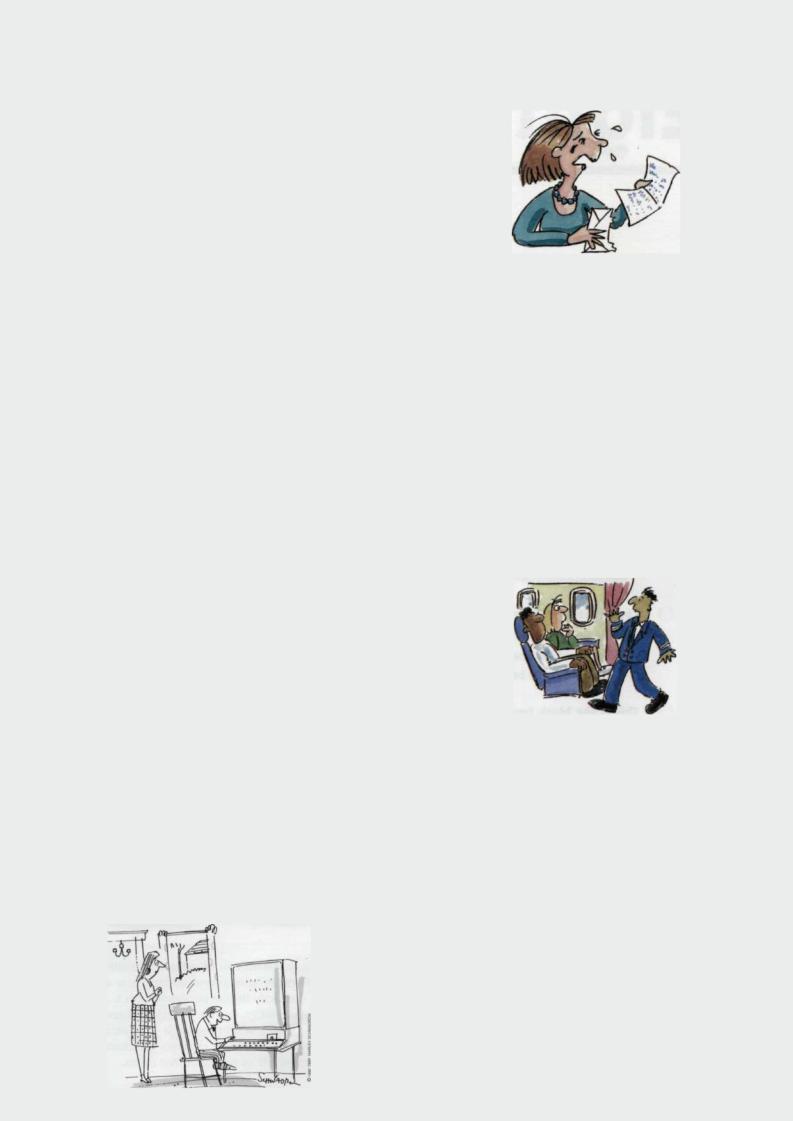
New Cambridge Advanced English
In . . . and out of. . .
Idioms and collocations
Fill the gaps with suitable expressions from the list below.
1 |
'Poor Julie was |
when she read the letter,' he |
|
|
|
|
|||
|
told me |
• |
|
|
|
|
|
|
|
2 |
If you're |
about what to write, it's best to make note |
|
|
|
||||
|
beforehand. |
|
|
|
|
|
|
|
|
3 |
|
business letters, personal letters are relatively easy |
|
|
|
||||
|
to write. |
|
|
|
|
|
|
|
|
4 |
I think he'll be upset and you shouldn't embarrass him |
|
so |
it may be better |
|||||
|
to tell him off |
• |
|
|
|
|
|
|
|
5 |
Writing an important letter is easier if you first write a rough copy |
before you |
|||||||
|
write the final version |
|
or type it. |
|
|
|
|
|
|
6 |
Orders may be placed by phone, by post or |
. You can pay by cheque, by credit card |
|
|
|||||
|
or |
. |
|
|
|
|
|
|
|
7 |
|
the size of your order we are prepared to offer a special discount of 10% |
|
|
|||||
|
the usual trade discount. |
|
|
|
|
|
|
|
|
8 |
We knew the firm was |
|
but not that they were |
such serious |
|
|
|
||
9 |
The book gave some information |
great |
|
but unfortunately the figures I needed |
|
|
|||
|
were only given |
|
|
|
|
|
|
|
|
10 |
She did me a favour and then asked what I'd do for he |
|
. At first I thought she meant it |
|
|
||||
|
|
but then I realised she was serious. |
|
|
|
|
|
||
|
|
|
|
|
|
|
|||
|
IN. . . |
addition to brief |
cash |
the circumstances |
comparison with detail |
difficulty doubt |
|
||
|
fun ink |
pencil person |
private |
public return |
tears |
trouble view of |
a whisper |
|
|
Fill the gaps with suitable phrases from the list below.
1 |
The passengers knew they were |
|
great |
when |
|
|
|
|
the pilot announced he was no longer |
of the aircraft. |
|
||||
2 |
Love letters will never be |
|
because people will go on |
|
|
||
|
falling |
. |
|
|
|
|
|
3 |
We used to keep |
|
regularly but I've lost her address |
|
|
||
|
and so now we are |
|
|
|
|
|
|
|
|
|
|||||
4 |
Sorry, it's not a very good photo because it's |
- I used to do a lot of photography but |
|||||
|
now I'm |
|
|
|
|
|
|
5 |
Although she's still |
considerable |
, she's |
and back home. |
|
||
6 |
Strawberries are |
|
this month but the shop hasn't got them |
|
|||
7 |
He really is |
: he lost his job last year and he's been |
ever since. Now he's |
||||
|
he can't afford to pay his mortgage - let's hope he doesn't end up |
! |
|||||
8 |
The twins are learning the violin but as they always play |
, they aren't allowed to practise |
|||||
|
in the house and they have to play |
! |
|
|
|
||
|
IN . . . or OUT OF. . . |
contact |
control |
danger debt |
doors |
fashion focus hospital |
love |
|
luck pain practice |
prison |
season |
stock touch |
tune work |
|
|
"Write a letter to Santa? It's easier just to
break into his computer distribution system.'
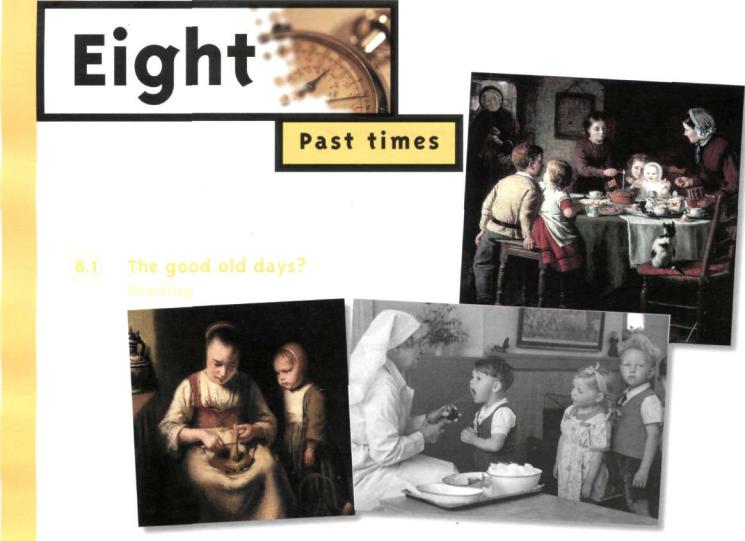
Look at each of the pictures and note down FIVE adjectives to describe each scene. Then decide:
*what century or period of history is shown
*what would have been pleasant about living at that time
*what would have been unpleasant about living then
1This is the blurb from the dustjacket of Chronicle of the 20th Century. The paragraphs have been mixed up. Decide on a suitable sequence for the paragraphs.
Whether you turn to Chronicle for nostalgia, enlightenment, reference or simply for fun, this unique book will be a treasured and much-read possession in every home. For the youngest and oldest, it is the book of our lifetimes.
There has never been a century like it - and never a book like Chronicle. This lavishly-illustrated book gives you a front-row seat for all the dramas of the century - from world wars to the fashions of the day - as they happened, with all the immediacy and excitement of tonight's television news.
Follow the lives of legendary figures such as Winston Churchill, recapture the whiff of scandals such as King Edward's abdication, thrill to great sporting victories, be chilled by disasters such as Aberfan, marvel at scientific discoveries and cheer at artistic triumphs from Picasso's first exhibition to the Beatles' first record - it's all in Chronicle, as fresh and dramatic as today's news.
Now, at last, it is available in an edition specially prepared for Great Britain, almost entirely new and reflecting the distinctly British perspective on a century that began when Queen Victoria was monarch to much of the world. With thousands of illustrations, many in full colour, this book captures the changing social and cultural life of our turbulent times.

Chronicle of the 20th Century is more than a book; it's an experience, taking you back in time to relive history as it happens. No wonder it's been a bestseller wherever it has been published with more than two million copies sold in Germany, France and the United States.
2Discuss these questions:
•What distinguishes Chronicle from other history books?
•What other editions of Chronicle have been published?
•How is the British edition different from other editions?
Chronicle of the 20th Century puts you there when man first flies an aeroplane or invents the "talking pictures". Discover what happened at the great moments of history - the Russian Revolution, the rise of Hitler, the D-Day landings, the bombing of Hiroshima, the assassination of President Kennedy and the Moon landing.
3 Write new versions of paragraphs and of the blurb to include the important events that happened in YOUR country in the 20th century.
Read the blurb from the cover of Dreams for Sale below and then discuss these questions about it:
1What is meant by 'popular culture'?
2What kind of events and people do conventional history books describe?
3Which parts of Dreams for Sale would you both find most interesting? 4 Which of the forthcoming titles would you like to read and why?
5 If you wanted just one 20th century history book, which would you buy: Chronicle or Dreams for Sale?
Why?
Harrap's Illustrated History of
the 20th Century
Dreams for Sale, the first in this new, six-volume history of the 20th century, offers both
the general reader and student a fascinating insight into the development of popular
culture since 1900. Drawing on a variety of images from the worlds of fashion,
entertainment and sport, Dr Richard Maltby provides a highly-readable analysis of the way
in which traditional cultural values have been replaced by a global industry which creates
and markets cultural "products" for popular consumption.
Coverage of all major fields of popular culture: film, music, fashion, design, sport, media
Imaginatively illustrated with photographs and full-colour artwork
Special features highlight events and personalities of particular interest
Chronological tables and datafiles provide factual reference at a glance
Text includes biographies of some 300 key figures of modern popular culture
Forthcoming titles in this series
Power: A Political History of the 20th Century
Wealth and Poverty: An Economic History of the
20th Century
The Family: A Social History of the 20th Century
The Arts: A History of Expression in the 20th Century
Science: A History of Discovery in the 20th Century
Discuss these questions:
•What historical events happened in the year you were born?
•What are the most significant historical events that have occurred during your lifetime?
•History is a subject that's taught in every school: why is this?
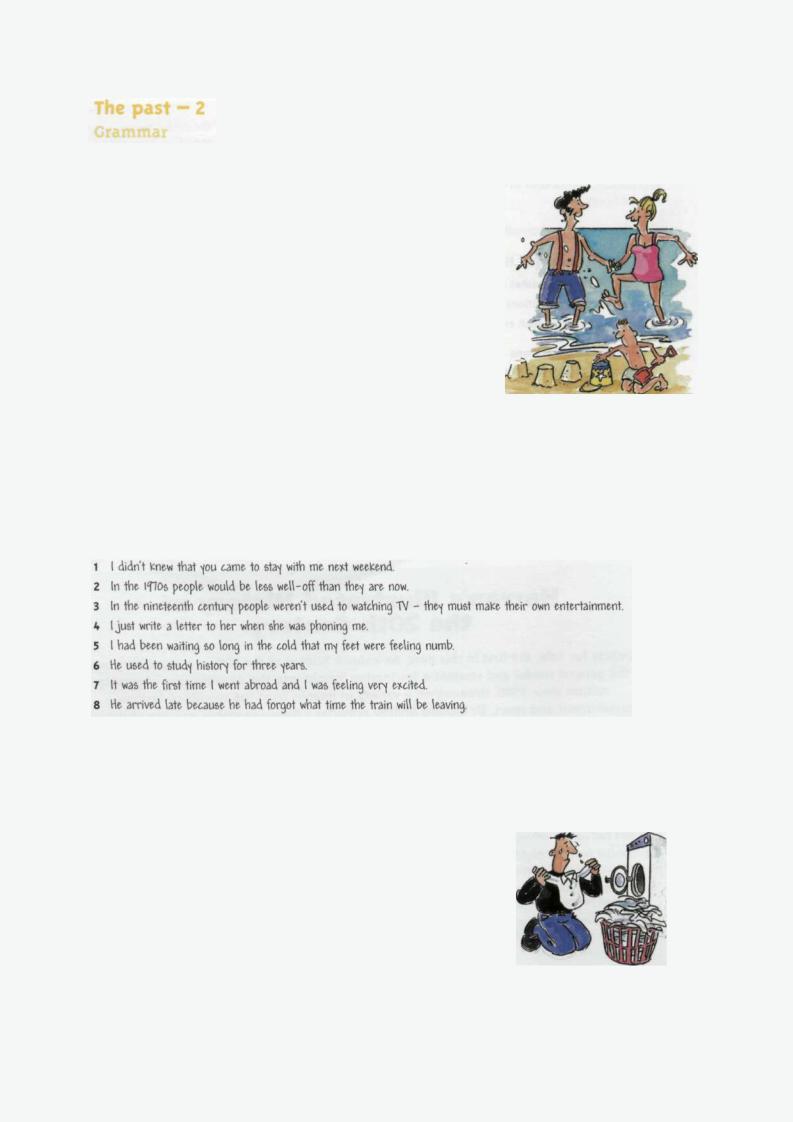
1 Discuss the differences in meaning between these sentences.
1When I was younger we would spend our holidays at the coast and.. . When I was younger we spent our holidays at the coast and. ..
When I was younger we had to spend our holidays at the coast and.. .
2When I was a child I didn't use to stay in hotels so . . .
When I was a child I wasn't used to staying in hotels so . ..
When I was a child I wouldn't stay in hotels so . . .
3 / was going to tell him what had happened but... I was telling him what had happened but...
I told him what had happened but. . .
I had told him what had happened but. . .
I was about to tell him what had happened but...
4 / could see that they had been doing some research because .. .
/could see that they had done some research because . . .
/could see that they were doing some research because . . .
I could see that they were going to do some research because . . .
5I used to be interested in reading history books .. .
I was interested in reading about history . . .
/ was used to reading history books . . .
2Decide how each sentence might continue . . .
Correct the mistakes in these sentences - one contains NO mistakes.
Replace the words in red with a suitable form of the irregular verbs listed below. Be careful because some of them may be tricky!
1 She rested on her bed after the wasp had bitten her.
2Have you made the tape go back?
3The storm made her wake up in the middle of the night.
k As he had never been in a plane before he held tightly to my arm. 5 He put all the clothes on the bed while he brushed the floor.
6The problems happened because the firm selected the wrong software.
7She cursed when someone stepped on her bad foot.
8We knew in advance that the essay would have to be done again.
9Napoleon sat on a white horse as he directed his troops in battle.
10 He cried when he saw that his new shirt had got smaller in the wash.
arise |
awake |
choose |
cling |
fly foresee lay lead lie rewind rewrite ride shrink |
sting |
swear |
sweep |
tread |
weep |
|
|
|
|
|

Fill the gaps in these two contrasting descriptions of Britain in the 19th century. Use the verbs below in their correct forms.
|
|
|
|
VICTORIAN |
BRITAIN |
|
|
|
|
|
|
|
|
|
|
|
|||
When Queen Victoria |
|
in 1901 she |
for 63 years. During her reign many |
||||||
great scientific discoveries |
|
|
and the population of Britain |
from 18 million |
|||||
to 40 million. The British Empire |
|
|
to become the largest empire the world |
ever |
|||||
|
and by then it |
|
|
a quarter of the world's people. During her reign Britain |
|||||
|
|
|
|
|
|||||
|
a time of peace and prosperity and |
not |
in any major war since |
||||||
the battle of Waterloo in 1815. No one |
that the First world War, in which so many |
|
|||||||
young men |
|
|
some 13 years later. |
|
|
|
|||
break out die enjoy fight grow include kill know make reign rise suspect
The Darker Side
During the reign of Queen Victoria (1837-1901) life for the middle classes and the aristocracy never better: the Industrial Revolution and the Empire them
with undreamed-of luxury, convenience and wealth - but at the expense of the lower classes.
Although slavery |
in the British Empire in 1834, the working classes in the slums of |
||
Britain's industrial cities |
almost as badly as slaves, and even young children |
||
to work long hours in factories and coal mines. During this period over 10 million |
|||
people |
from these appalling conditions and |
to America and Australia. |
|
The magnificent Empire which |
vast profits to Britain's manufacturers |
||
the people of the colonies, who |
cheap raw materials for British factories, and |
||
nations of clients who |
to depend on a supply of British products. |
||
abolish be bring come create emigrate escape exploit force produce provide treat
Decide how to match the names in the first column with the places in the second and dates in the third. Then discuss the questions below.
Archduke Franz Ferdinand |
Battle of Hastings |
1963 |
Charles Lindbergh |
Sarajevo |
1914 |
Christopher Columbus |
Dallas, Texas |
1066 |
Ferdinand Magellan |
Russia |
1903 |
John F. Kennedy |
Pacific Ocean |
1917 |
Napoleon |
Moon |
1927 |
Neil Armstrong |
Waterloo |
1815 |
October Revolution |
Atlantic Ocean |
1969 |
Wilbur and Orville Wright |
Atlantic Ocean |
1521 |
William the Conqueror |
Dayton, Ohio |
1492 |
|
|
|
•What happened exactly? What were the long-term effects of each event?
•How would the world be different if these events hadn't happened?
•What are the three most significant historical events missing above?
